Hardkernel has just launched the ODROID-M2 low-profile SBC based on a Rockchip RK3588S2 octa-core Cortex-A76/A55 AI SoC with up to 16GB LPDDR5, 64GB eMMC flash, an M.2 PCIe socket, support for three displays through HDMI, USB-C, and MIPI DSI interfaces, gigabit Ethernet, and more.
The ODROID-M2 follows the ODROID-M1 and ODROID-M1S single board computers based on respectively Rockchip RK3568 and RK3566 quad-core Cortex-A55 processors, but a significantly more powerful Rockchip RK3588S2 processor, and a larger 90x90mm form factor to accomodate for extra features and interfaces.
ODROID-M2 specifications:
- SoC – Rockchip RK3588S2
- CPU – Octa-core processor with 4x Cortex-A76 cores @ up to 2.3 GHz (+/- 0.1Ghz), 4x Cortex-A55 cores @ up to 1.8 GHz
- GPU – Arm Mali-G610 MP4 GPU @ 1 GHz compatible with OpenGL ES 3.2, OpenCL 2.2, and Vulkan 1.2 APIs
- VPU – 8Kp60 video decoder for H.265/AVS2/VP9/H.264/AV1 codecs, 8Kp30 H.265/H.264 video encoder
- AI accelerator – 6 TOPS (INT8) NPU
- System Memory – 8GB or 16GB 64-bit LPDDR5 (4GB RAM variant coming soon).
- Storage
- 64GB eMMC flash
- MicroSD card slot with UHS-I SDR104 mode support
- M.2 M-Key socket with PCIe 2.1 x1 for NVMe SSDs
- Video output
- HDMI 2.0 up to 4K @ 60Hz with HDR, EDID
- DisplayPort via USB-C port
- 30-pin MIPI DSI connector (note: different from the 31-pin connector on the ODROID-M1)
- Networking – Gigabit Ethernet RJ45 port
- USB
- USB 2.0 host port
- USB 3.0 host port
- USB 3.0 Type-C port with DP Alt-Mode (not a power source/sink)
- Expansion
- 40-pin Raspberry Pi-compatible GPIO header
- 14-pin GPIO header
- Debugging – Serial debug console
- Misc
- Power button, Reset button
- System LEDs
- Red (POWER) – Solid light when DC power is connected
- Blue (ALIVE) – Flashing like a heartbeat while the Linux kernel is running, solid light in u-boot.
- PCF8536 RTC with CR2032 backup battery holder
- Boot priority switch for eMMC or microSD card
- Power Supply – 7.5V to 15.5V DC input via 5.5/2.1mm power barrel jack; 12V/2A power adapter recommended
- Power Consumption (Hardkernel numbers)
- Power Off – About 0 Watt
- IDLE – About 1Watt without any peripherals
- CPU stress test – About 7.5 Watts (Performance governor) without any peripherals
- Dimensions – 90 x 90 x 21mm
- Weight – 78g including heatsink, 58g without heatsink
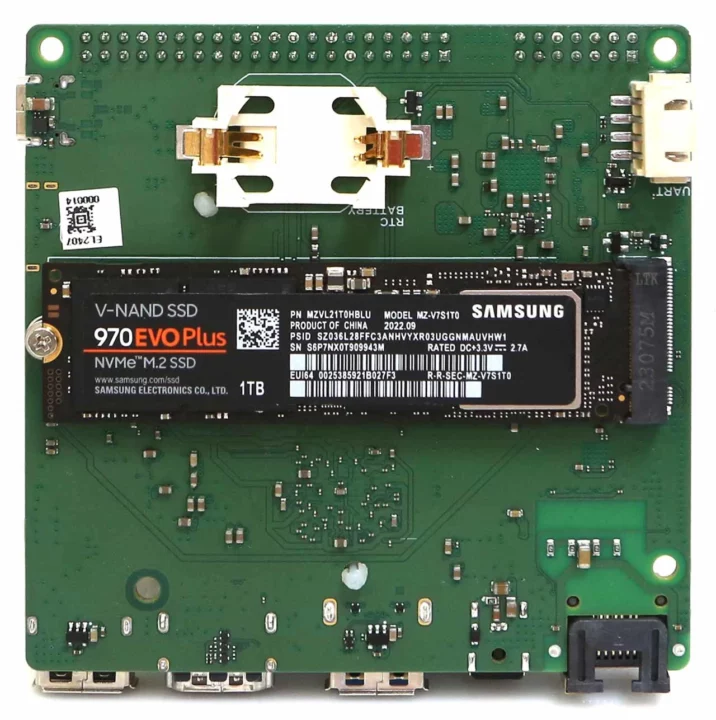
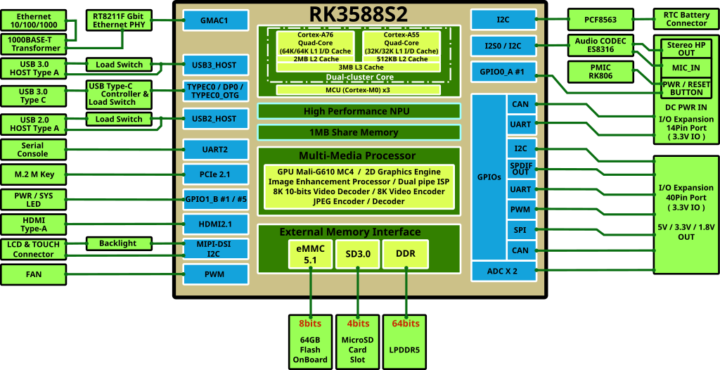
You may have heard about the RK3588S, but not necessarily about the RK3588S2, and we wondered about the difference between the two in our Radxa ROCK 5C article:
how does RK3588S2 differ from RK3588S? They are basically the same except the RK3588S2 comes with an additional MIPI CSI interface which is not used in the ROCK 5C.
The MIPI CSI interface is not used in the ODROID-M2 either, but there must be a good reason why both companies selected the RK3588S2 instead, either pricing or availability…
In terms of performance, Hardkernel explains the ODROID-M2 is better than the ODROID-M1S in every way:
- Multicore performance is about 3 times faster.
- About twice the memory bandwidth with LPDDR5 64-bit RAM
- The Mali-610 GPU is over 5 times faster.
- The 6TOPS NPU is over 3 times faster.
- The 64GB eMMC flash is twice as fast thanks to an HS400 interface.
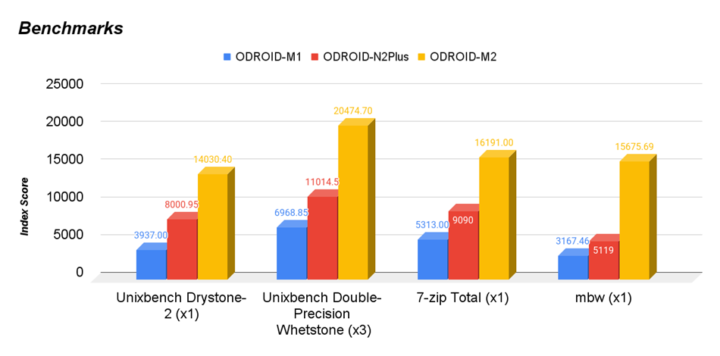
One downside is that the new ODROID-M2 is fitted with a heatsink with a fan for cooling, while the earlier models could operate fanlessly. Having said that, Hardkernel mentions the fan seldom rotates in the video below, so I’d assume some people may just decide to disconnect the fan.
Hardkernel is usually better than most other SBC vendors when it comes to software support. We typically just get a list of operating systems, but the Korean company goes into more detail when it comes to software features.
- Android 13
- Based on AOSP
- Customized raw GPIO access framework (in other words, GPIOs works in Android).
- SPI ( CAN receiver, LED strip lights, IO expander)
- UART (Loopback test, Barcode scanner, Thermal printer)
- GPIO toggling
- Rotary encoder with GPIO IRQ
- PWM outputs
- Ubuntu 20.04 LTS Kernel 5.10
- Wayland-based GNOME desktop
- ARM Mali Bifrost GPU OpenGL-ES / EGL driver
- MIPI DSI driver
- GPIO drivers and WiringPi library
- NPU driver and Neural Network APIs
- VPU driver with MPP/Gstreamer APIs
- Ubuntu 24.04 with a newer kernel version will be released in a few months
You can see a short demo in Android 13 with two 4K displays one playing a 4K video and the other running 3DMark with 3D graphics acceleration. More details about the hardware and software can be found on the wiki.
Hardkernel sells the ODROID-M2 SBC on its own store for $115 with 8GB LPDDR5, 64GB eMMC flash, and an enclosure, while the 16GB RAM model goes for $145. The upcoming 4GB RAM model will sell for under $100, more exactly for $95 once it becomes available.
Compatible accessories include:
- 12V/2A Power Supply: $5.50
- ODROID-Vu8S MIPI-DSI Kit – $39
- WiFi/Bluetooth Module 5BK: $8.90
- Weather Board Zero: $2
- CAN-FD add-on board: $11
- USB-UART Kit: $9.90
- Cube Case: $28 with four USB ports for gamepads (retro gaming)
- Vu12 12.3-inch LCD display: $120
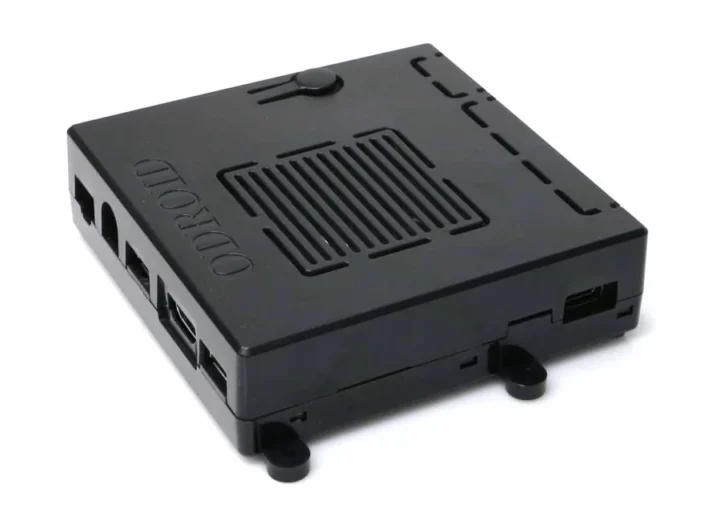
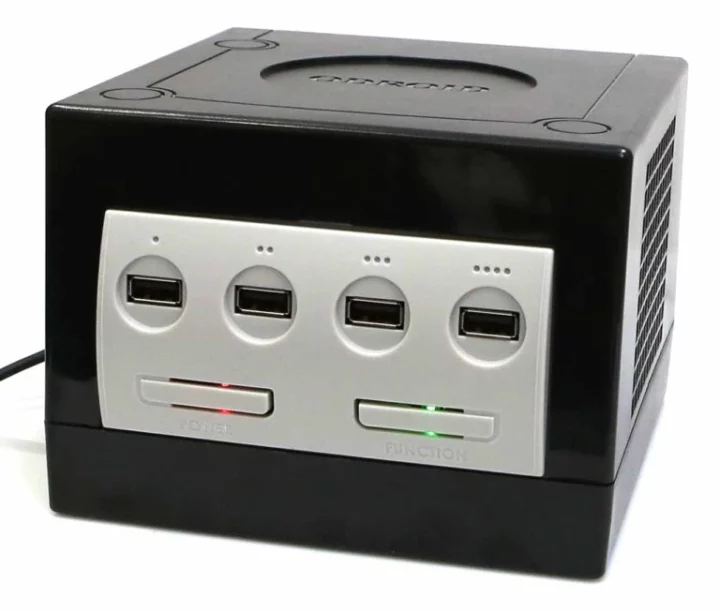
Thanks to “T” for the tip.

Jean-Luc started CNX Software in 2010 as a part-time endeavor, before quitting his job as a software engineering manager, and starting to write daily news, and reviews full time later in 2011.
Support CNX Software! Donate via cryptocurrencies, become a Patron on Patreon, or purchase goods on Amazon or Aliexpress


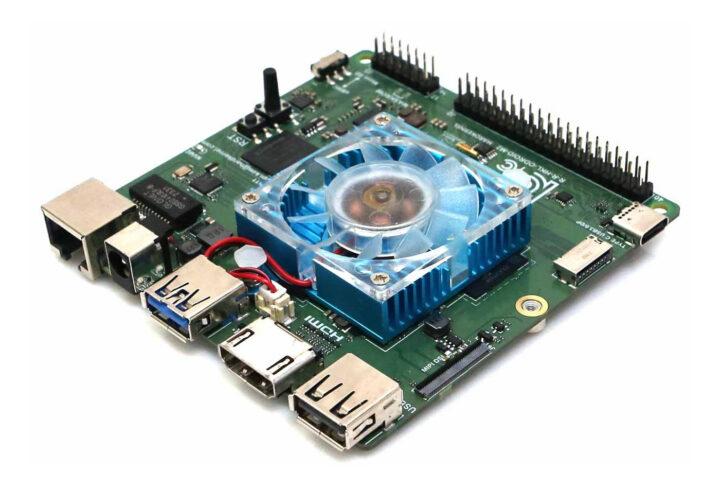




The case is made of plastic?
It is, as it’s several of their other devices and it’s very durable.
I’ve dropped a N2 and C4 several times, dropped the C4 last night and it’s never damaged the device or case.
Is it powerful enough to play GameCube games? Asking those who have similar boards 😉
It’s RK3588 so yes it can play GameCube, some games can even be upscaled
These things cost almost as much as an N100 box. Skip this junk and get an N100
Almost the cost of a n100 without ram. Hardkernel often have a tad of a premium.
Radxa do a 5c rk3588s2 for £40 on aliexpress…
A similarly equipped Rock5C lite with 8GB RAM, 64GB eMMC, and heatsink/cooling fan costs $100 USD with no case.
Odroid M2 8GB RAM which comes with case, heatsink/fan, and 64G eMMC is $115.
I don’t believe there is a premium on their devices but perhaps you see it differently and that’s okay, a benefit of all these devices out there is something for everyone can be had.
If you choose the Rock 5C (non-lite) which is the same SoC as the M2 it’s the same price $115 USD
No its not. I don’t need a case as it will be on brass pillars in likely in or behind something. I also don’t need 8 or 16gb ram either for .
5C 4GB £49.64, 5C 8GB £65.47, 5C Lite 16GB £85.82
Those are the real prices and no they are not £100 but range from £49 upwards depending on config and accesories.
The consumer style plastic cases are not that much of an interest to me and don’t want to be charged for pointless extras I will not use.
What enclosure, power solution IO and pheripherals and hats often make supplied cases null and void.
There is a £14 metal case for the 5C but if I have to I prefer the Opi5 ‘armour case’ that is on aliexpress for £10 as it can make a great heatsink also.
In a server rack on a tray and a similar setup for a VESA tray.
Often though its just brass pillars so why pay for what I don’t need.
The prices are above and delivery and tax I guess depend on what country your in.
The Opi5 is about the same price also and Radxa and OrangePi often are demonstrating design services as much as product whilst Odroid does seem to be more product based that seems to provide more complete software and support and that does have a slight premium.
I have a Rock3b with a 6 sata M.2 card runing x5 and x1 hot spare raid 6 array.
There are many pheripherals that just don’t fit in provided cases which is even worse with N100 devices.
I tend not to just have consumer desktop needs where my desktop is a Xeon RTX workstation but SBC boards are boards because from OEM to industrial housing and function needs a far more open choice than a ‘this is it’ consumer case.
I quite like some of the Odroid designs especially the more NAS like ones.
For I would of prefered the rk3568 & rk3588 and seen how they intergrate the pcie3.0 x2 and x4 lanes on those SoCs than the rk3566 & rk3588s but hey as they could of been interesting.
Going back to the OP people buy SBC because they are single board computers and sometimes this makes prescribed cases an ill fit.
The prices you see and what I see in the US are different, I was simply making an apples to apples comparison with memory, storage, and heatsink/fan.
Of course a board with less RAM and no eMMC or cooling will cost less as you already know.
https://freeimage.host/i/dXZMjMF
What I will say is any rk3588 device should come with a cooling solution of some sort in my opinion, it can be misleading to the ill informed that these devices can run without it.
> What I will say is any rk3588 device should come with a cooling solution of some sort in my opinion, it can be misleading to the ill informed that these devices can run without it.
The Odroid-M1 design was nice because the SoC was at the bottom, touching a board-wide heat sink. The RK3588 could work fine with such a large heat sink. But here with the SoC at the top, there’s indeed no other solution than having this small fan, which is a complete no-go for me.
Those prices are aliexpress and the ship everywhere as far as I know and didn’t seem to be apples to apples.
Raspberry Pi don’t ship with a heatsink, because its choice from small stuck on to fan or armour case.
So depending on your end enclosure and heatsink needs once more if it can become a pointless extra.
Also soldered on emmceventually forces obsolescence but the ram range and emmc modules of the 5c allow the choice of whatever emmc you wish and also to be able to easy replace on any failure.
I would prob buy a 5c or Opi5 because all thoose items do have choice and also the cost is much cheaper…
Do you also recc. N100 for non-state actors in Lebanon?
If you want Intel by all means get an n100 based device.
Hardkernel doesn’t make junk, I’ve got many of their devices running 24/7 for years on end and NONE have failed and I know quite a few others who can say the same.
I agree. The only one that failed on me was while hot-plugging a SATA drive (which was not supported by the board, I didn’t know). It was pretty obvious they were not used to see failure reports, as they accepted to spend quite some time helping me find a solution. They updated their docs to add a warning against doing this, and allowed me to try to repair the board myself by replacing the fried chip, which didn’t work, then they exchanged it for me. That’s *exactly* how I think hardware vendors should proceed: trust the customer, attempt a local repair to avoid an RMA if the customer is willing to try it, and commit to the warranty if the customer fails to repair it. I must say I have an excellent trust in their hardware design and in their ability to provide solutions in case of problems.
I did lose the LAN port on an XU4 which was my tvheadend server during a thunderstorm but the device still functions fine, I just added USB LAN and kept using it for several more years. I no longer record OTA programming but I may get back to it someday. I had comskip dialed in really well it all worked so nicely.
I do wish I knew how to fix it but my ability to replace surface mount components is limited and I’m not actually sure what was damaged by the lightning strike.
It’s very likely the transformer inside the Ethernet jack which fried from the voltage surge. It’s easy to verify with an ohmmeter. You should have 1 to 2 ohms between pins 1-2, 3-6, 4-5, 7-8. If you have nothing on such a pair, it’s fried. If you have 0 ohm, the coil probably melted. The problem is that it’s difficult to change such jacks which integrate a transformer because 1) they’re not very frequent, and 2) each model has a different pinout. If the transformer looks good, it might be the ethenet phy behind it (possibly a single chip integrating everything). If it disappeared from USB enumeration you’re certain it’s dead. Otherwise… you don’t know, and it may or may not help to replace the chip. Maybe in this case it’s better that you keep your external cable 🙂
Thanks, I will certainly check the pins and see what they read.
With this information I can also check the non-working 4th LAN port on a Belkin RT3200 router I purchased on eBay last year. It seems like it originally worked at 100Mbps but now it doesn’t work at all.
Note that on 100 Mbps you only have 2 pairs, 1-2 and 3-6.
It’s a gigabit port but would only connect at 100 before it quit functioning totally.
Wish it wasn’t so expensive. I’d be interested at $100 area
The 4GB model is coming soon and will be $95, Jean-Luc mentioned it near the end of the article.